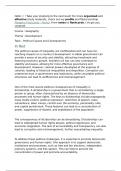Hello 😊 ! Take your studying to the next level! For more organized and
effective study materials, check out my profile and flashcard shop
Maggie's Flashcards - Payhip. From notes to flashcards, I've got you
covered!
Course : Geography
Theme : Development
Topic : Political Causes and Consequences
In Text
The political causes of inequality are multifaceted and can have far-
reaching impacts on a country's development. A stable government can
provide a sense of security and stability, attracting investment and
fostering economic growth. Avoided civil war can also contribute to
stability and peace, allowing for more effective governance and
development. However, colonial powers developed at the expense of
colonies, leading to historical inequalities and disparities. Corruption can
undermine trust in government and institutions, while unsuitable political
structures can lead to inefficiencies and mismanagement.
One of the most severe political consequences of inequality is
dictatorship. A dictatorship is a government that is controlled by a single
person or group, often characterized by an absence of democratic
processes and human rights. The keys to dictatorship include propaganda,
mass media control, political repression, restriction of speech, mass
surveillance, labor camps, control over the economy, personality cults,
and capital punishment. These features can lead to a concentration of
power, suppression of dissent, and exploitation of the population.
The consequences of dictatorship can be devastating. Dictatorships can
lead to widespread human rights abuses, political oppression, and
economic stagnation. The lack of accountability and transparency can also
lead to corruption and mismanagement, further exacerbating inequality.
To address these political challenges, it is essential to promote democratic
governance and human rights. One approach is to support democratic
institutions and processes, such as free and fair elections, independent
judiciary systems, and free speech. This can help to prevent the
concentration of power and promote accountability.
, Another solution is to promote economic development through
transparent and inclusive policies. This can involve investing in education,
healthcare, and infrastructure, as well as promoting entrepreneurship and
innovation. By doing so, countries can reduce poverty and inequality,
creating more opportunities for all citizens.
In conclusion, understanding the political causes of inequality is crucial for
addressing these challenges. By recognizing the complex interplay
between government structures, power dynamics, and human rights, we
can work towards creating a more just and equitable world.




